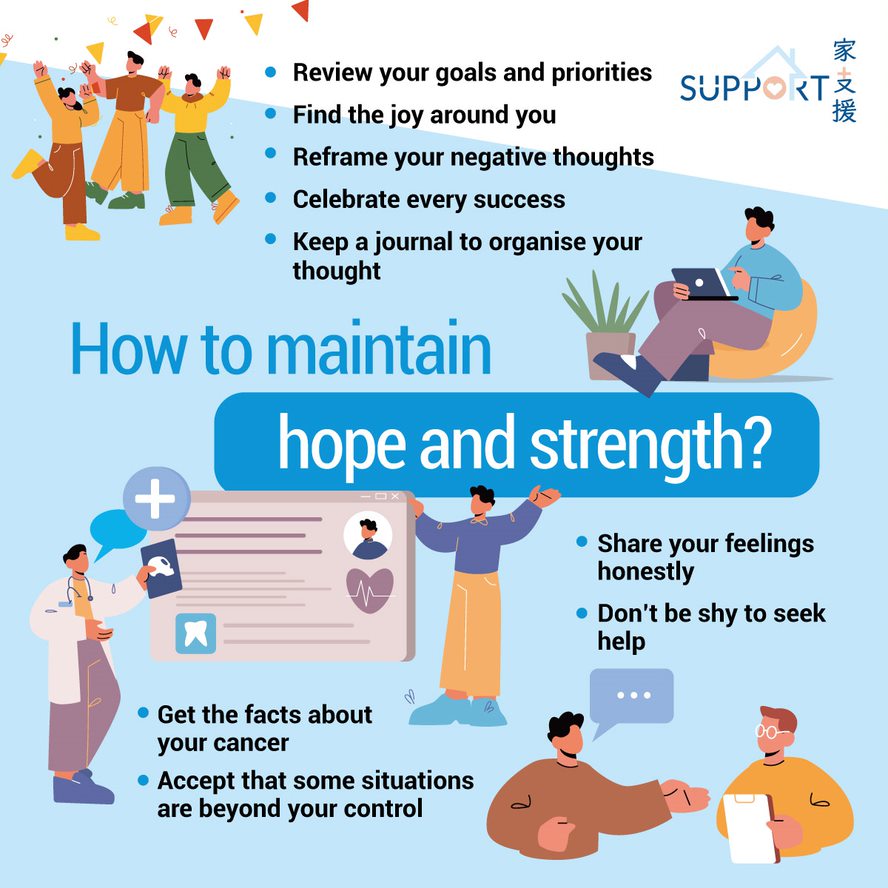1. Get the facts about your cancer
- Gather information about your cancer from your healthcare team. You may want to ask information like:
- Cancer type and stage, any spread to other sites
- Any immediate complications and long-term complications
- Treatment options and their benefits and side effects
- How to take care of yourself and how your family can help
- This information can help you make decisions on your care plan.
- Bring a relative or friend with you for doctor appointments in order to help you remember what the doctor tells you.
2. Accept that some situations are beyond your control
- Of course, this is easier said than done. You may go through different stages of grief including denial, anger, bargaining, and depression before acceptance.
- The “Serenity Prayer” says, “God grant me the serenity to accept the things I cannot change, the courage to change the things I can, and the wisdom to know the difference.” Yes, always “do your best, leave the rest”.
3. Allow yourself to be sad sometimes and share your feelings with others honestly.
- No one would be happy if they are diagnosed with cancer or told that their cancer has recurred or progressed after treatment. It is normal to be sad after bad news.
- Keep an honest and open communication with your loved ones, doctor and healthcare team.
- Share your thoughts and feelings with your loved ones. A two-way and open communication allows you to draw strength from each other.

4. Don’t be shy to ask for help
- Being strong doesn’t mean you never need help. On the contrary, it’s a sign of strength that you recognise you cannot do everything on your own.
- Learn to accept help from your families and friends. When they help you in your hard times, they receive comfort from contributing to your well-being.
5. Review your goals and priorities
- Determine what is important in your life. Make a list of your goals, dreams and what you hope for in the future – short-term and long term.
- Find time for the activities that are important to you and are most meaningful to you.
- You may feel weak and easily getting tired. Understand your physical limitations. Prioritise things you wish to do when you have energy.
6. Recognise your inner strength. Find a source of spiritual support.
- When you are emotionally down, find and remember your reason to fight. Draw from your reason to fight and find your inner strength. Seek for spiritual support and push through.
7. Find the joy around you
- Close your eyes and imagine the things that make you feel peaceful.
- Enjoy the things around you. Maybe these are simple things, e.g., the soothing melody from the bird outside, the warm embrace of the sun on your skin, the intoxicating aroma of beautifully assorted flowers, watching a funny TV show, etc.
- Getting a short happy moment doesn’t mean that you’re disregarding or ignoring your problems. A brief respite from your worries and enjoying the little intricacies that life offers can be the refreshment you need.
8. Reframe your negative thoughts
- Reframing negative thoughts really is one of the best ways to stay strong when life gets overwhelmingly tough.
- An example of a negative thought would be: “My daughter is busy and cannot visit me every day”. Instead, try not to dwell on the negatives and rephrase it into: “My daughter is busy but she bought my favourite food two days ago. She will come again in the weekends.”
- Another example: “No one understands my pain.” can be rephrased into: “My doctor prescribed some pain medications. Let me trust him and try the medicine today.”
9. Keep making plans
- Making plans for your future gives you reasons to continue and the courage to endure.
- A plan can be a short-term one. It should be realistic. For example, plan for a day out in the mall to buy a nice T-shirt; plan for making a cake to celebrate the birthday of your loved ones; plan for writing a thank-you card to your healthcare team; writing a letter to your wife so that she can remember your words after you pass away, etc.
10. Celebrate every success
- Don’t focus on failure. Celebrate the big and little victories you experience each day.
- For example, cancer treatment can be tough and debilitating. Being able to participate in social activities is an achievement worthy of celebration.
- Even if you feel a heavy shroud of unpleasantness around you, try and recognize the positive things happening in life all the time.
11. Keep a journal to organise your thought
- Writing a journal can help you vent your emotions.
- Fighting cancer and dealing with the daily burdens of life will be overwhelming if you are not managing your emotions well. Take some time for reflection and replenishment. This will give you strength.
12. Learn from the past, live in the moment, prepare for the future
- “Live in the moment” is always an advice from psychologists on how to stay strong during tough times. However, we can’t just pretend that the past and future don’t exist. Learn from the past, don’t live in it. Leave it behind. Don’t live for tomorrow. Prepare for it, but don’t count on it. Remember, tomorrow is not promised.
Special thanks to Ms. Kelly Yee-Ting Kwan and Dr. Wendy Wing-Lok Chan, Department of Clinical Oncology, the University of Hong Kong for authoring and editing this article.
Last updated on 1 Nov 2021.


